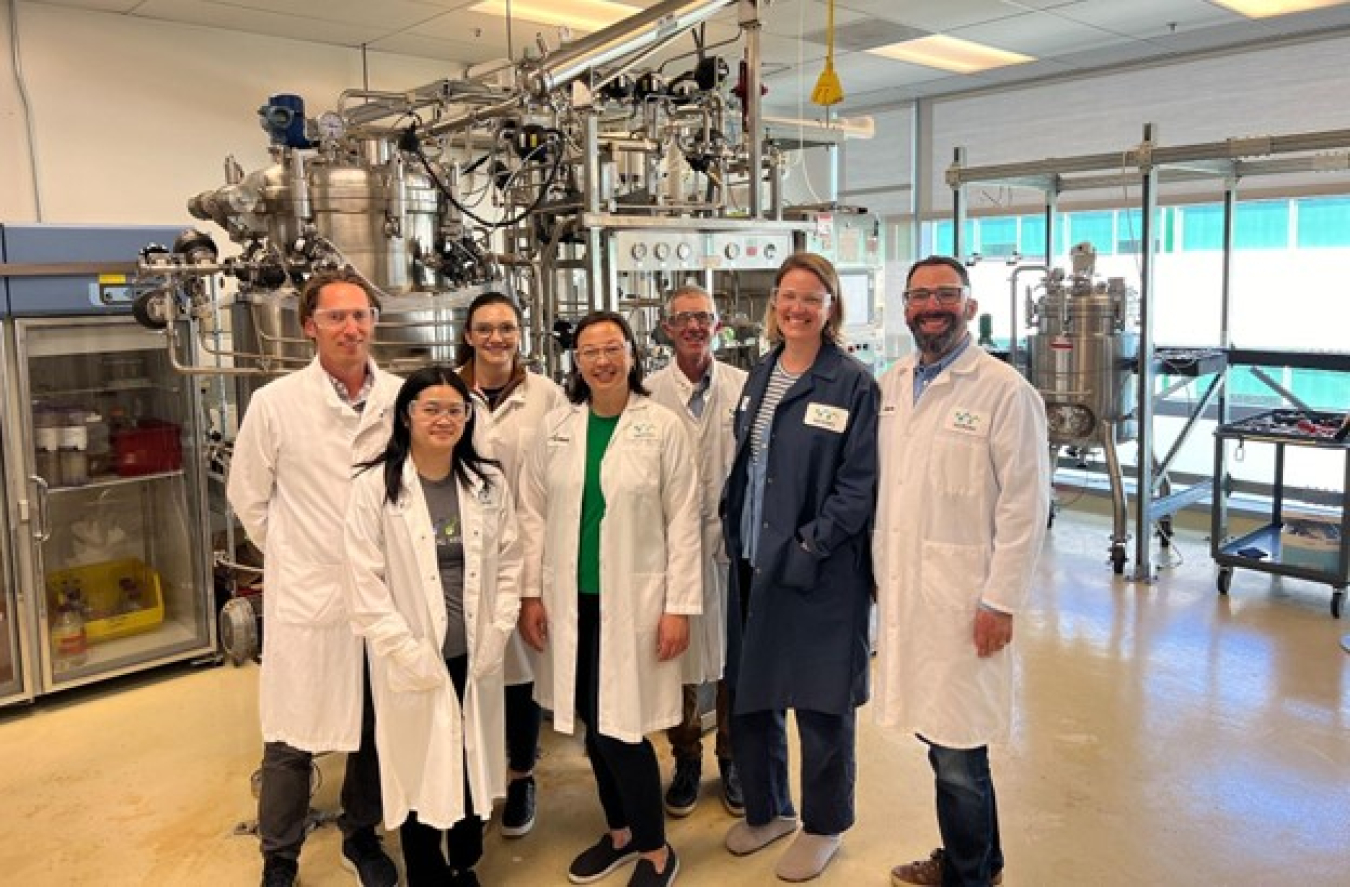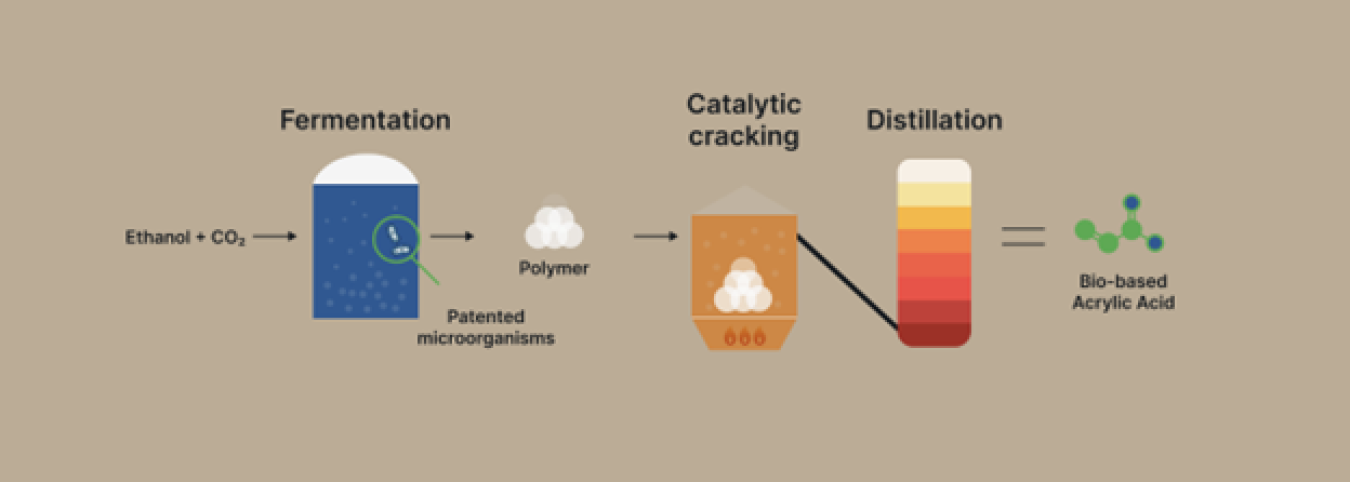Researchers at the U.S. Department of Energy’s Bioenergy Technologies Office (BETO) funded Agile BioFoundry (ABF) and the Advanced Biofuels and Bioproducts Process Development Unit (ABPDU), have successfully scaled up a bio-based process that converts ethanol into a valuable precursor for consumer products, such as paints, coatings, and diapers. The researchers worked with industry partner, Industrial Microbes, to develop the technology.
October 7, 2024Dr. Gayle Bentley

Dr. Gayle Bentley is a technology manager for the Conversion Program in the Bioenergy Technologies Office at the U.S. Department of Energy (DOE). She oversees a diverse research and development portfolio focused on enabling the industrial production of renewable biofuels and biochemicals. Dr. Bentley is actively engaged in developing government-wide strategies to support the bioeconomy, including initiatives in data, synthetic biology, and plastics strategy. Prior to her role at DOE, Dr. Bentley was a postdoctoral researcher at the National Renewable Energy Laboratory where she engineered microorganisms to produce value-added chemicals. She holds a PhD in Molecular Microbiology and Microbial Pathogenesis from Washington University in St. Louis, and both a bachelor’s degree in microbiology and a master’s degree in public health from The University of Arizona.
Researchers at the U.S. Department of Energy’s Bioenergy Technologies Office (BETO) Agile BioFoundry (ABF) and Advanced Biofuels and Bioproducts Process Development Unit (ABPDU), have successfully scaled up a bio-based process that converts ethanol into a valuable precursor for consumer products, such as paints, coatings, and diapers. The researchers worked with industry partner, Industrial Microbes, to develop the process.
The scaled up process produces poly(3-hydroxypropionate) or P3HP, a precursor to acrylic acid, widely used across the consumer product industry. Though acrylic acid is typically sourced from petroleum, Industrial Microbes is developing a sustainable, bio-based process for producing it. The company sought the expertise and equipment available at the ABF and ABPDU to help them scale up their process.

“In the early days of this type of work, maybe 20 years ago, a company might have spent several million dollars building their own pilot plant and training people,” said Noah Helman, CEO of Industrial Microbes. “But with the ABF and ABPDU, we can work directly with these world experts who’ve seen projects across the spectrum. The ability to access that expertise and drop into that infrastructure is unparalleled.”
Working with ABPDU’s Eric Sundstrom, the team performed several experiments to collect data and screen process conditions. They also screened the strain in the Sartorius Ambr® 250 system, which identified key process improvements.

“The low carbon footprint of this process has been attractive to these producers. By continuously optimizing our process, we are confident that we can get to greater than a 75% reduction in carbon footprint, and possibly get to a net zero product,” Helman said. “Our partners are really excited about that.”
“The strain scaled up beautifully and the key metrics at 300 L matched those from our lab. This is a testament to the robustness of the strain, the team that developed the process, and the expertise of researchers at the Agile BioFoundry,” said Elizabeth Clarke, CTO of Industrial Microbes.
The ABF team also led the application of high throughput proteomics — led by ABF scientist Chris Petzold — to inform strain engineering.
“The proteomics showed that we had too much expression of one of the pathway enzymes. Once we adjusted that, the performance improved,” Clarke said. “That was a very direct result of the fact that we had proteomics data available from ABF studies.”
Moving forward, the ABF team will be using the data collected in these experiments to train a predictive model that will suggest process improvements and strain engineering targets. This work, led by ABF scientist Philip Laible, aims to achieve predictive scale-up for Industrial Microbes’ P3HP production process. Clarke said she appreciated the flexibility of the ABF and ABPDU teams and the focus they had on making sure the project achieved their company’s goals.
“Early on in this project, we made changes to the process to lower the carbon footprint, which is very important to our customers,” she said. “Everyone at the ABF and ABPDU was immediately on board and focused on doing the work that was going to help us move as fast as possible.”
Following the 300-liter milestone, Industrial Microbes is working toward scaling up their process further and converting purified P3HP to acrylic acid. In discussions with commercial producers, Helman said the fact that they have already scaled up and generated prototype product that can be tested in real applications is a significant selling point.
“This partnership is accelerating the validation of both the scientific and the production conditions for our solutions, opening up the door to commercial partnerships for low-carbon footprint products,” Helman said. “At a time when bio-based products are seeing growing traction, the support from the ABF and ABPDU helped us get ahead of the curve.”
The Agile BioFoundry is a consortium of seven U.S. Department of Energy (DOE) national laboratories that operate as a distributed biofoundry in collaboration with industry and academia. Funded by BETO, their work supports BETO’s goals to develop sustainable aviation fuels and decarbonize energy-intensive industries. They collaborate with industry and academia to accelerate innovation and to identify and help remove barriers to adopting new biomanufacturing methods.
Established by the U.S. Department of Energy (DOE) Bioenergy Technologies Office as part of the Lawrence Berkeley National Laboratory, the Advanced Biofuels and Bioproducts Process Development Unit (ABPDU) enables early-stage biofuels, biomaterials, and biochemicals product and process technologies to successfully scale from the lab to commercial relevance. The facility’s mission is to expedite the commercialization of advanced, next-generation biofuels, biochemicals, and other bioproducts by providing industry-scale test beds to bridge the gap between promising research and large-scale production and decarbonize transportation, food, manufacturing and other industrial sectors. ABPDU collaborates on projects spanning a wide range of conversion processes to fuels, chemicals, proteins, and materials with partners ranging from national labs and universities to emerging start-ups and established multi-nationals.
Dr. Gayle Bentley is a technology manager for the Conversion Program in the Bioenergy Technologies Office at the U.S. Department of Energy (DOE).

